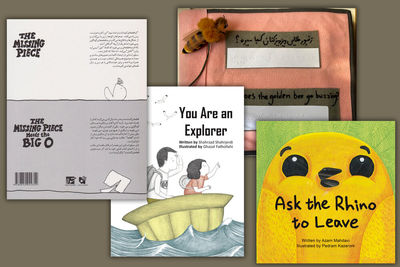Among the books submitted by the Children’s Book Council of Iran are “The Missing Piece Meets the Big O”, “Where Does the Golden Bee Go Buzzing?”, “The Last Picture” and “18+2 Woodpecker”.
The submissions also include “Mother”, “You Are an Explorer” (also translated as “We Are Explorers”), “Ask the Rhino to Leave” and “Chapaki”, the council announced on Wednesday.
Based on Shel Silverstein’s book of the same name, “The Missing Piece Meets the Big O” has been designed and implemented by Soda Azadi Namin for visually impaired children.
The missing piece sat alone waiting for someone to come along and take it somewhere. All it wants is to roll along with its perfect match, but some are too small, others too big, and some fit yet don’t roll. The missing piece feels sad and lonely until it meets the Big O, and learns that all it ever needed was a little encouragement and determination to fulfill its dreams.
Designed and implemented by Haleh Haqbejaneb, “Where Does the Golden Bee Go Buzzing?” teaches visually impaired infants how to find the right directions.
With its simple, credible and true narrative, “The Last Picture” written by Leila Darabi describes the world of children with autism and their families.
Through symbolism and poetic language, “18+2 Woodpecker” clarifies the deafness issue and delves into the world of hearing impaired children. With illustrations by Salimeh Babakhan, the book was written by Mohammad-Hadi Mohammadi.
In “Mother”, Hoda Haddadi has created illustrations for the story of a poem by Iraj Mirza, a famous Iranian poet who lived most his life during the 19th century. With its simple illustrations, the book helps create a poetic perception for hearing impaired children.
Illustrated by Ghazal Fathollahi, “You Are an Explorer” shows fraternity, imagination, collaboration and self-improvement against the pain of war.
Through the love between two brothers and their imagination, writer Shahrzad Shahrjerdi leads us to reflect on the hardships suffered by some people as a result of conflicts in their countries of origin that force them to leave their homes in search of something better.
“Ask the Rhino to Leave” by Azam Mahdavi is a great wordless book with lovely illustrations by Pedram Kazeruni that focuses on social relationships and helps children with their skills in making friends.
It helps kids to look beyond the apparent and get to know people’s intentions and inner selves. A little chick is afraid of a rhino. She constantly covers her eyes and asks him to go away. After all, he’s much bigger and that scares her. But is that sufficient reason to be scared of someone? A kind heart comes in all shapes and sizes!
In her story in “Chapaki”, writer Zahra Jalaifar provides a deep insight into the psychological effects of divorce on children. The book has been illustrated by Hajar Moradi.
Every two years experts working with the IBBY Collection for Young People with Disabilities select outstanding titles for and about children and young adults with disabilities from around the world. The IBBY headquarters is located in Basel, Switzerland.
Many young people with disabilities cannot read or enjoy a conventional book, or they cannot find a suitable book among the many publications available, IBBY has said.
Therefore they need specially produced books or selected regular books of literary and artistic quality that meet their special needs regarding design, language, plot structure and pictures.
The IBBY collection located at the Toronto Public Library features a large international selection of books for and about young people with disabilities.
Source: Tehran Times

